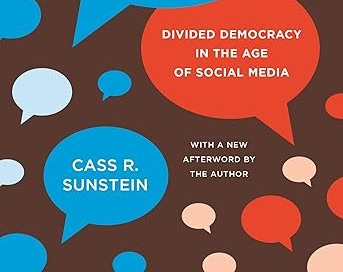Review: #republic: Divided democracy in the age of social media
Sunstein, C. R. (2018). #Republic: Divided democracy in the age of social media. Princeton University Press. $13.08
Cass Sunstein’s third book of the series on divided democracy is one that, according to Alvin Zhou, “Sunstein's previous readers may confidently skip” (p. E14). His previous two books, Republic.com and Republic.com 2.0 discuss and cover the same materials with only slight changes, according to Zhou. The exception to this is the addition of social media in this text.
Within the book, Sunstein writes about the lack of serendipitous exposure to ideas and information and the lack of shared experiences. He perceives these as threats which can lead to political fragmentism and extremism. He refers to the “daily me” which is the echo chamber created when individuals are able to curate their own news and online interactions. This daily me bypasses the “street corner” where individuals are exposed to all sorts of news and sources. The premise is that most people do not choose to consider or interact with information or media that they do not enjoy, unless it’s done serendipitously.
Sunstein continues in the text to talk about the algorithms that ensure that the information we want to see is what we do see and that the information in which we have no interest, never appears in our feeds. He makes the claim that daily me is not only something individuals make, but something that the algorithms of social media and search engines make for individuals.
According to Dominic Marin in his 2018 review of the book, while the daily me is a crucial piece of information, the text does not go far enough into “the severity of the Daily Me phenomenon” (p. 361). Martin continues by making a comparison between the “daily me” and demographic-specific newspapers that have existed for many years such as “African-American newspapers that have been offering different coverage of common issues since the early nineteenth century” (p. 361).
Further in the book, Sunstein makes a claim that seems to be the contrary of his premise mentioned early: that speaking with people in person results in more extremisms.
In particular, Sunstein claims that groups of people who are already polarized will become more extreme after interacting with others with whom they disagree. Sunstein points to an experiment that took place in 2005 in Colorado that brought right and left leaning community members together and grouped them to discuss topics such civil unions. According to Sunstein, “In almost every group, members ended up with more extreme positions after they spoke with one another. Discussion made civil unions more popular among liberals; discussion made civil unions less popular among conservatives” (p. 68).
Throughout the text, Sunstein continues to recycle the call to variety and serendipity. He makes claims that the founding fathers of our country even understood the importance of this and even alludes to it being the purpose of freedom of speech and freedom of assembly and says that “these sites must be opened up for speech,” and that we “are entitled to have access to them” (p. 226).
While the majority of the text is simple to understand, Sunstein makes it difficult to understand what he believes the next step should be. In the U.S., we have freedom of press and freedom of assembly. Those are guaranteed by the U.S. Bill of Rights. Those parks, on American land, must be open to serendipitously welcome people and their ideas. As social media and the internet are not physical spaces to be opened, those organizations that operate on the internet are able to tailor their algorithms in any way they prefer which as Sunstein has claimed and has shown in the text, can lead to extremism on both sides of the political spectrum.
William West, University of Nebraska—Lincoln
References
Marin, D. (2018). #republic: Divided democracy in the age of social media, by Cass R. Sunstein. Business Ethics Quarterly 28(3), 360-363. 10.1017/beq.2018.22
Sunstein, C. R. (2017, March). #Republic: Divided democracy in the age of social media. Princeton University Press.
Zhou, A. Y. (2017). [Rev. of #Republic: Divided democracy in the age of social media]. Journal of Communication, 67(6), E12–E14. https://doi.org/10.1111/jcom.12344





